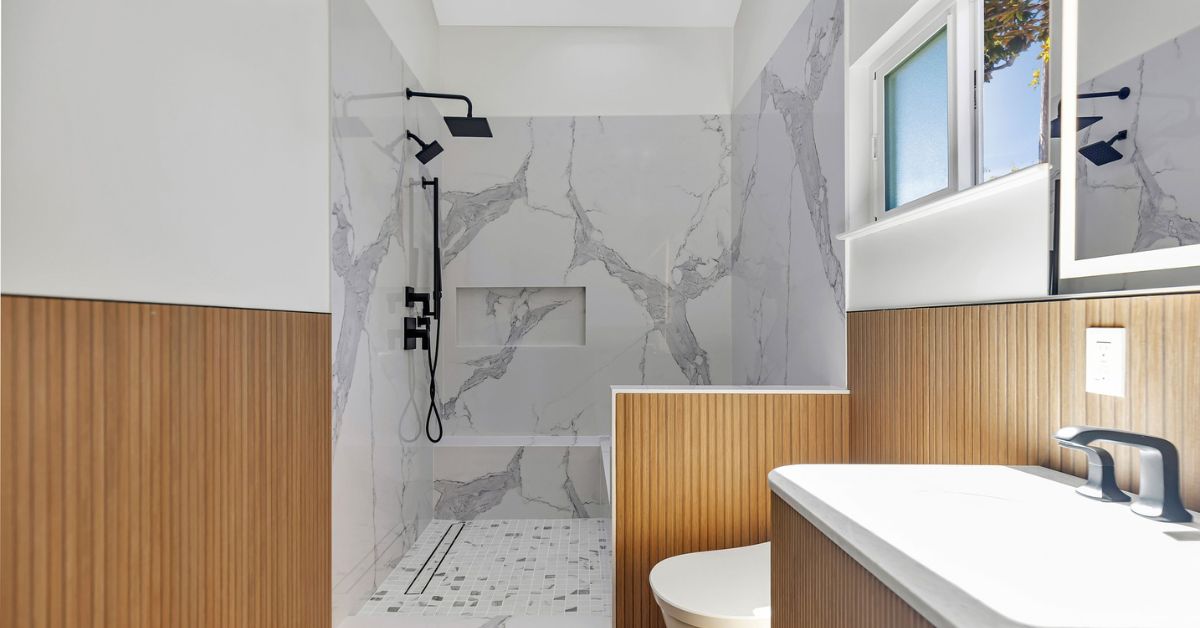When it comes to choosing tiles for your bathroom floor, several factors like durability, maintenance, and slip resistance play a critical role in making the right choice. The bathroom floor is constantly exposed to moisture, which requires a tile that can withstand water and frequent cleaning while also offering safety features to prevent slips. Here is the list of tiles that are most commonly used for bathroom floors:
- Porcelain tiles
- Ceramic Tiles
- Marble Tiles
- Mosaic Tiles
- Limestone Tiles
- Slate Tiles
- Vinyl Tiles
- Terracotta Tiles
1. Porcelain Tiles
Porcelain tiles are among the most popular choices for bathroom floors due to their durability and sleek appearance. Known for their water resistance and low maintenance needs, porcelain tiles come in various colors and styles to suit any bathroom design.
- Durability: Porcelain is one of the most durable tile options available, making it ideal for bathrooms. It is resistant to cracks, chips, and scratches, and holds up well against moisture.
- Maintenance: Porcelain tiles are relatively easy to maintain. Regular cleaning with mild detergent is sufficient to keep them looking fresh.
- Slip Resistance: Porcelain tiles are slip-resistant if you choose the right finish. Matte or textured finishes provide excellent traction, reducing the risk of slipping.
2. Ceramic Tiles
Ceramic tiles offer a broad range of designs and styles, making them a versatile option for bathroom floors. They are generally more affordable than porcelain tiles while still being durable enough for bathroom environments.
- Durability: Ceramic tiles are durable but slightly less resistant to damage compared to porcelain. However, they are still a great choice for light to moderate foot traffic areas like bathrooms.
- Maintenance: Ceramic tiles are easy to maintain with regular sweeping and mopping. Grout lines may require occasional deep cleaning.
- Slip Resistance: Ceramic tiles are not as slip-resistant as other options unless you select textured or anti-slip varieties. A polished ceramic tile can be slippery when wet.
3. Marble Tiles
Marble tiles bring elegance and luxury to any bathroom, creating a timeless look. While beautiful, they require more care and attention compared to other tile types.
- Durability: Marble is a durable stone, but it is more porous and prone to staining than porcelain or ceramic. It may require sealing to protect against moisture damage.
- Maintenance: Regular sealing and gentle cleaning are essential to maintain marble’s appearance and prevent water absorption. Avoid harsh chemicals.
- Slip Resistance: Marble can be slippery, especially when polished. Opt for honed or textured marble to improve slip resistance.
4. Mosaic Tiles
Mosaic tiles are small, colorful tiles often arranged in intricate patterns, providing a highly decorative touch to your bathroom floor.
- Durability: Mosaic tiles are durable, but they tend to have more grout lines, which can be vulnerable to staining or damage over time.
- Maintenance: Mosaic tiles require regular cleaning, and grout lines may need extra attention to prevent mildew or dirt buildup.
- Slip Resistance: The small size of mosaic tiles provides more grout lines, increasing traction and making them less slippery than larger tiles.
5. Limestone Tiles
Limestone tiles bring a natural, earthy aesthetic to your bathroom. However, they are more sensitive to moisture compared to other stone tiles.
- Durability: Limestone is durable but porous. It can be susceptible to staining and damage from acidic substances, so it must be sealed regularly.
- Maintenance: Limestone tiles require more maintenance than porcelain or ceramic, including frequent sealing to prevent water penetration.
- Slip Resistance: Textured limestone tiles are slip-resistant, but smooth finishes can become slippery when wet, so it’s important to choose a matte or rough finish.
6. Slate Tiles
Slate tiles are known for their natural beauty and are excellent for adding a rustic or contemporary look to bathroom floors.
- Durability: Slate is a highly durable stone tile, resistant to water, wear, and temperature changes.
- Maintenance: Slate requires little maintenance once sealed properly. It is essential to apply a sealant regularly to protect it from moisture and stains.
- Slip Resistance: Slate naturally has a rough surface, which provides excellent slip resistance, making it a safe option for bathroom floors.
7. Vinyl Tiles
Vinyl tiles are a budget-friendly and versatile option for bathroom floors, available in a wide range of designs and finishes, including those that mimic more expensive materials like wood or stone.
- Durability: Vinyl tiles are resistant to moisture, but they are more prone to damage from heavy furniture or sharp objects compared to stone or ceramic tiles.
- Maintenance: Vinyl tiles are very easy to clean and maintain. Sweeping and mopping are sufficient to keep them in good condition.
- Slip Resistance: Vinyl tiles come with slip-resistant finishes, especially those with textured surfaces. They are a great choice for safety in the bathroom.
8. Terracotta Tiles
Terracotta tiles have a rustic appeal and bring warmth to your bathroom, often found in Mediterranean or country-style designs.
- Durability: Terracotta is not as durable as porcelain or stone tiles and can be prone to cracking or chipping. It requires proper sealing to protect against moisture.
- Maintenance: Terracotta tiles require regular sealing and careful cleaning to prevent stains. Grout may need more frequent attention.
- Slip Resistance: Terracotta’s natural surface can be quite slip-resistant, but it depends on the finish. Choose textured tiles to improve slip resistance in wet conditions.
Factors To Consider When Choosing Tiles For Bathroom Floors
Budget
Your budget will play a significant role in determining the type of tile you can afford. Make sure to factor in not only the cost of the tiles but also installation and maintenance expenses. While some tiles like ceramic and vinyl are more affordable, options like marble and slate may be on the higher end.
Slip Resistance
In a private bathroom, class R10 is usually sufficient. You can play it safe in floor-level showers with class R11. In addition to these classes, there are also the designations A, B, and C. They describe the slip resistance in barefoot areas. Choose tiles with higher slip resistance for safety, especially if you are concerned about wet floors.
Maintenance
Think about how much time and effort you are willing to invest in tile maintenance. Some tiles require more upkeep than others. Porcelain and vinyl are low-maintenance, while natural stone tiles like marble and limestone require more attention to keep them looking good.
Durability
Bathroom tiles need to withstand moisture and daily wear and tear. Opt for tiles that are durable and water-resistant to ensure longevity. Porcelain and slate tiles are excellent choices for durability, while softer stones like limestone may require more care.
Style & Aesthetics
Consider the overall style of your bathroom and choose tiles that complement it. Whether you prefer a modern, classic, or rustic look, there’s a tile that can enhance your bathroom’s aesthetics. Mosaics and terracotta tiles can add a distinctive touch, while sleek porcelain and marble tiles offer a timeless appeal.
Why Tiles Are The Best Option for Bathroom Floors?
Choosing the right flooring is key, not only for aesthetic appeal but for the functionality of the space. Tile flooring is the superior choice for bathrooms for several reasons. First, it’s an affordable option that fits a wide range of budgets. Tiles are also great at keeping moisture out, protecting your bathroom from water damage. Finally, the versatility of bathroom tile flooring is unmatched. With many options like peel-and-stick bathroom floor tiles, you can easily find classic and contemporary styles that fit any design vision.





